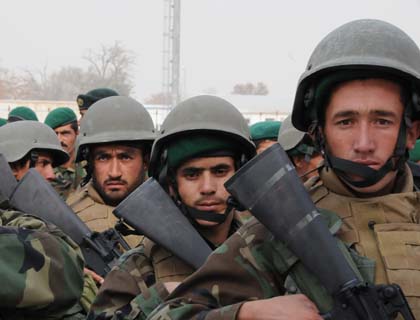KABUL - Program managers for a program to develop a judicial system in Afghanistan can’t account for all of the funds devoted to the project, a top U.S. watchdog warned, putting millions of tax dollars at risk.
The Special Inspector General for Afghanistan Reconstruction, in a report to be released Friday, reported that there has been a lack of contractor oversight and no clear assurances that the effort is being effectively funded, raising concerns about the State Department’s latest contracting agreement over a $47.8 million project.
“We gave them nearly $50 million on the honor system,” said John Sopko, the top inspector general for the U.S. effort in Afghanistan. “Once again, the American taxpayers are left crossing their fingers and hoping this money isn’t wasted. If history is any lesson, I am not too hopeful.”
Since 2005, the State Department has given $223 million for justice-sector development in Afghanistan, including training judges, developing case-management systems and building capacity at Afghan ministries.
In its audit, SIGAR found that the State Department’s contract for the programs aimed at case-management and training regional judicial officers were flawed and limited the agency’s ability to assess the contractor’s performance and exercise proper oversight.
One contractor was required to develop a case management system to track and record court cases throughout Afghanistan’s justice system, and propose a “robust” plan for ensuring the Afghan government could support the system, without defining “robust” or setting realistic goals.
The contractor was able to implement only an Internet-based case-management system in seven of Afghanistan’s 34 provinces. In response, department officials modified the contract only by replacing the nationwide system with one that required implementation in the seven provinces where it already had been installed.
The State Department acknowledged in a response letter to SIGAR that proper oversight was lacking, but said management and oversight reforms had been implemented beginning in January 2013.
“We established schedules for recurring visits,” wrote James Walsh, executive director of the State Department’s Bureau of International Narcotics and Law Enforcement Affairs. “Communication improved with the contractor’s quality-control staff, and the files are being stored in an electronic file-share location.”
The State Department wrote that it agreed with all of SIGAR’s recommendations, but only partially agreed with the watchdog’s suggestions for a new contracting agreement for developing justice-training programs.
In January 2013, INL struck an agreement with a new contractor, the International Development Law Organization, to take over the justice-training component. However, SIGAR has expressed concern the new agreement has even fewer oversight requirements than the original contract and does not give the State Department direct auditing capabilities or access to spending records.
In a September response letter to an earlier inquiry from SIGAR, the State Department said that it had installed officials within the program to run audits and report records to the agency. The department also noted that there had been no reports or reason to suspect wasteful spending in the program.
“It is important to note that there has been no evidence — nor have allegations been made — of fraud, waste, or mismanagement of [the judicial-training program]. As we would do with any project implemented by an organization, if waste, fraud, or abuse were to be uncovered, or an allegation thereof, the Department of State would promptly investigate and undertake corrective action or terminate the program,” wrote James Dobbins, the special representative for Afghanistan and Pakistan.
SIGAR responded bluntly, arguing that even if there was no any evidence or allegations of fraud, waste, and abuse, direct oversight was mandatory.
“Self-monitoring does not obviate the need for INL to protect its right to access all records related to how taxpayer funds are spent on the [program],” the watchdog wrote. (WT)

